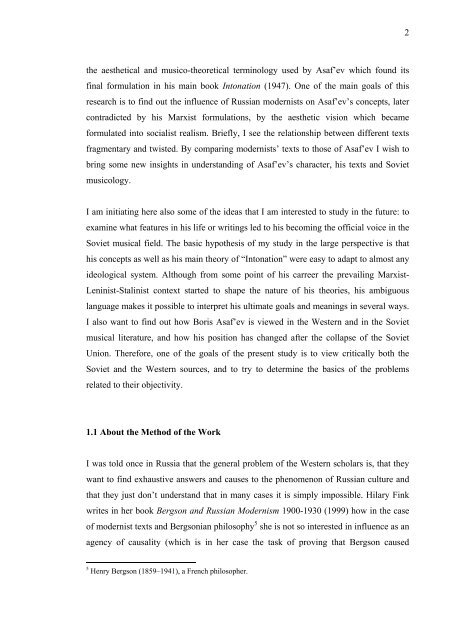Boris Asaf'ev and the Soviet Musicology - E-thesis
Boris Asaf'ev and the Soviet Musicology - E-thesis
Boris Asaf'ev and the Soviet Musicology - E-thesis
Create successful ePaper yourself
Turn your PDF publications into a flip-book with our unique Google optimized e-Paper software.
<strong>the</strong> aes<strong>the</strong>tical <strong>and</strong> musico-<strong>the</strong>oretical terminology used by Asaf’ev which found its<br />
final formulation in his main book Intonation (1947). One of <strong>the</strong> main goals of this<br />
research is to find out <strong>the</strong> influence of Russian modernists on Asaf’ev’s concepts, later<br />
contradicted by his Marxist formulations, by <strong>the</strong> aes<strong>the</strong>tic vision which became<br />
formulated into socialist realism. Briefly, I see <strong>the</strong> relationship between different texts<br />
fragmentary <strong>and</strong> twisted. By comparing modernists’ texts to those of Asaf’ev I wish to<br />
bring some new insights in underst<strong>and</strong>ing of Asaf’ev’s character, his texts <strong>and</strong> <strong>Soviet</strong><br />
musicology.<br />
I am initiating here also some of <strong>the</strong> ideas that I am interested to study in <strong>the</strong> future: to<br />
examine what features in his life or writings led to his becoming <strong>the</strong> official voice in <strong>the</strong><br />
<strong>Soviet</strong> musical field. The basic hypo<strong>the</strong>sis of my study in <strong>the</strong> large perspective is that<br />
his concepts as well as his main <strong>the</strong>ory of “Intonation” were easy to adapt to almost any<br />
ideological system. Although from some point of his carreer <strong>the</strong> prevailing Marxist-<br />
Leninist-Stalinist context started to shape <strong>the</strong> nature of his <strong>the</strong>ories, his ambiguous<br />
language makes it possible to interpret his ultimate goals <strong>and</strong> meanings in several ways.<br />
I also want to find out how <strong>Boris</strong> Asaf’ev is viewed in <strong>the</strong> Western <strong>and</strong> in <strong>the</strong> <strong>Soviet</strong><br />
musical literature, <strong>and</strong> how his position has changed after <strong>the</strong> collapse of <strong>the</strong> <strong>Soviet</strong><br />
Union. Therefore, one of <strong>the</strong> goals of <strong>the</strong> present study is to view critically both <strong>the</strong><br />
<strong>Soviet</strong> <strong>and</strong> <strong>the</strong> Western sources, <strong>and</strong> to try to determine <strong>the</strong> basics of <strong>the</strong> problems<br />
related to <strong>the</strong>ir objectivity.<br />
1.1 About <strong>the</strong> Method of <strong>the</strong> Work<br />
I was told once in Russia that <strong>the</strong> general problem of <strong>the</strong> Western scholars is, that <strong>the</strong>y<br />
want to find exhaustive answers <strong>and</strong> causes to <strong>the</strong> phenomenon of Russian culture <strong>and</strong><br />
that <strong>the</strong>y just don’t underst<strong>and</strong> that in many cases it is simply impossible. Hilary Fink<br />
writes in her book Bergson <strong>and</strong> Russian Modernism 1900-1930 (1999) how in <strong>the</strong> case<br />
of modernist texts <strong>and</strong> Bergsonian philosophy 5 she is not so interested in influence as an<br />
agency of causality (which is in her case <strong>the</strong> task of proving that Bergson caused<br />
5 Henry Bergson (1859–1941), a French philosopher.<br />
2

















